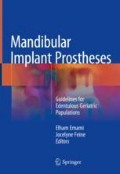Abstract
Guidelines for the occlusion of mandibular implant-supported overdentures are presented based on best available evidence. Often the cause for late implant failure is due to occlusal overload. Various occlusal schemes have been described in the literature, but none have been determined as being superior over another. More research is required to evaluate the prognosis of various occlusal schemes following treatment. Moreover, the lack of devices for monitoring objectively the degree of force placed on implants makes the topic a clinical challenge where proper tooth selection is important. In this chapter, the records required to set denture teeth and their relation to one another are described. Based on the setting of the articulator and patient situation, the occlusal scheme can be linked to specific treatment protocols. Particularly, the various occlusal schemes that the posterior denture teeth can be arranged are described and are related to several specific patient scenarios.
Access this chapter
Tax calculation will be finalised at checkout
Purchases are for personal use only
References
Lindqvist LW, et al. Bone resorption around fixtures in edentulous patients treated with mandibular fixed integrated prostheses. J Prosthet Dent. 1988;59:59–63.
Bonwill WGA. The scientific articulation of the human teeth as founded on geometrical, mathematical, and mechanical laws. Dental Items of Interest, pp. 617–43, October 1899. In Vol. I, Classic Prosthodontic Articles. A.C.O.P., pp. 1–28.
Weinberg LA. An evaluation of basic articulators and their concepts. Part II. Arbitrary, positional, semiadjustable articulators. J Prosthet Dent. 1963;13:644–63.
Hanau RL. Articulation defined, analyzed, and formulated. J Am Dent Assoc. 1926;13:1694.
Lang BR, Razzoog ME. Lingualized integration: tooth molds and an occlusal scheme for edentulous implant patients. Implant Dent. 1992;1:204–11.
Zarb G. Prosthodontic treatment for edentulous patients. 13th ed. St Louis: Mosby; 2013. p. 225–6.
Zarb G. Prosthodontic treatment for edentulous patients. 13th ed. Mosby; 2013. p. 275–7.
Author information
Authors and Affiliations
Corresponding author
Editor information
Editors and Affiliations
Rights and permissions
Copyright information
© 2018 Springer International Publishing AG, part of Springer Nature
About this chapter
Cite this chapter
Pesun, I.J. (2018). Occlusal Consideration for Mandibular Implant Overdentures. In: Emami, E., Feine, J. (eds) Mandibular Implant Prostheses. Springer, Cham. https://doi.org/10.1007/978-3-319-71181-2_15
Download citation
DOI: https://doi.org/10.1007/978-3-319-71181-2_15
Published:
Publisher Name: Springer, Cham
Print ISBN: 978-3-319-71179-9
Online ISBN: 978-3-319-71181-2
eBook Packages: MedicineMedicine (R0)

